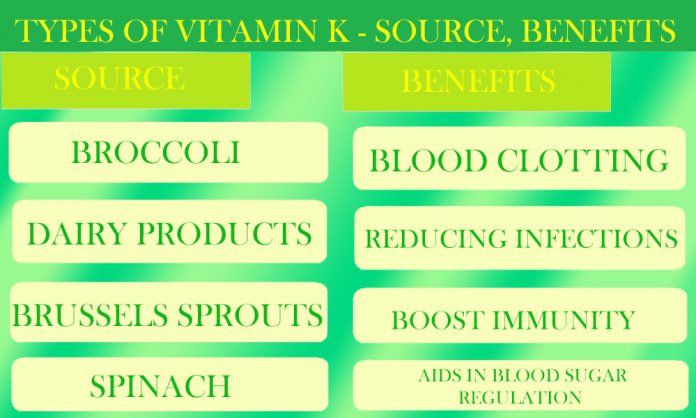Vitamin K belongs to the family of fat – soluble vitamins. If talked scientifically, then it comprises 2 – methyl – 1, 4 – naphthoquinone (3-) derivatives.
It is one of the most important vitamins that are required by our body. As it is a fat – soluble vitamin and is stored in our body, therefore, there is no need to consume this vitamin on the regular basis. Read more about other healthy vitamins.
Types/ Forms of Vitamin K:
Vitamin K is actually a group of compounds but the most important of these compounds are K1 and K2. Vitamin K1 is also known as phylloquinone and is made by plants. It is highly available in the green leafy vegetables. Basically, it is the plant form of vitamin K. On the other, vitamin K2 consists of a number of chemical subtypes and is obtained from meat eggs and synthesized by bacteria.
Health benefits of Vitamin K:
Vitamin K plays a key role in blood clotting. Actually, it activates the proteins that clot blood. Also, it helps in keeping our heart healthy. Vitamin K also improves bone density and restores oral health. Apart from all this, vitamin K has the ability to fight certain cancers by reducing infections.
Effect of overdose of vitamins
From where do we get Vitamin K?
Vitamin K can be easily obtained from the food we eat. The rich source of this vitamin includes green leafy vegetables like kale, spinach etc, fermented soy, spring onions, Brussels sprouts, broccoli, dairy products, prune, cucumbers, and dry basils. Apart from this, vitamin K can be easily available in the form of supplement which you can get from the market.
How much amount of Vitamin K is sufficient?
Before consuming this vitamin, it is essential to know that how much amount is sufficient as per RDA (recommended daily allowance). This amount varies from children to adults.
Which Vitamin Helps to avoid Diabetes
For Children:
| Age | Amount |
| Birth to 6 months | 2.0 mcg |
| 7 months to 12months (1 year) | 2.5 mcg |
| 1 to 3 years | 30 mcg |
| 4 to 8 years | 55 mcg |
| 9 to 13 years | 70 mcg |
For males and females (14 years and up):
| Males | 75 to 120 mcg |
| Females | 75 to 90 mcg |
| Pregnant women | 75 to 95 mcg |
| Lactating women | 75 to 100 mcg |
Diseases caused by the deficiency of Vitamin K:
Disease cause of deficiency of Vitamin C
Basically, vitamin K is associated with blood clotting and deficiency of this vitamin causes easy bleeding from even small cuts and wounds. It may be worse at the time of surgery and operation. Lack of vitamin K causes the easy flow of blood. Apart from its role in blood coagulation, vitamin K is also related to the healthy bones. Deficiency of this vitamin in our body leads to weak and fragile bones which in turn lead to tiredness and weakness.
Signs and symptoms of vitamin K deficiency:
These are some of the signs and symptoms which can easily tell you are you are lacking vitamin K in your body:
- Nose bleeding
- Bleeding gums
- Easy bruising
- Blood in the urine
- Heavy menstrual bleeding












